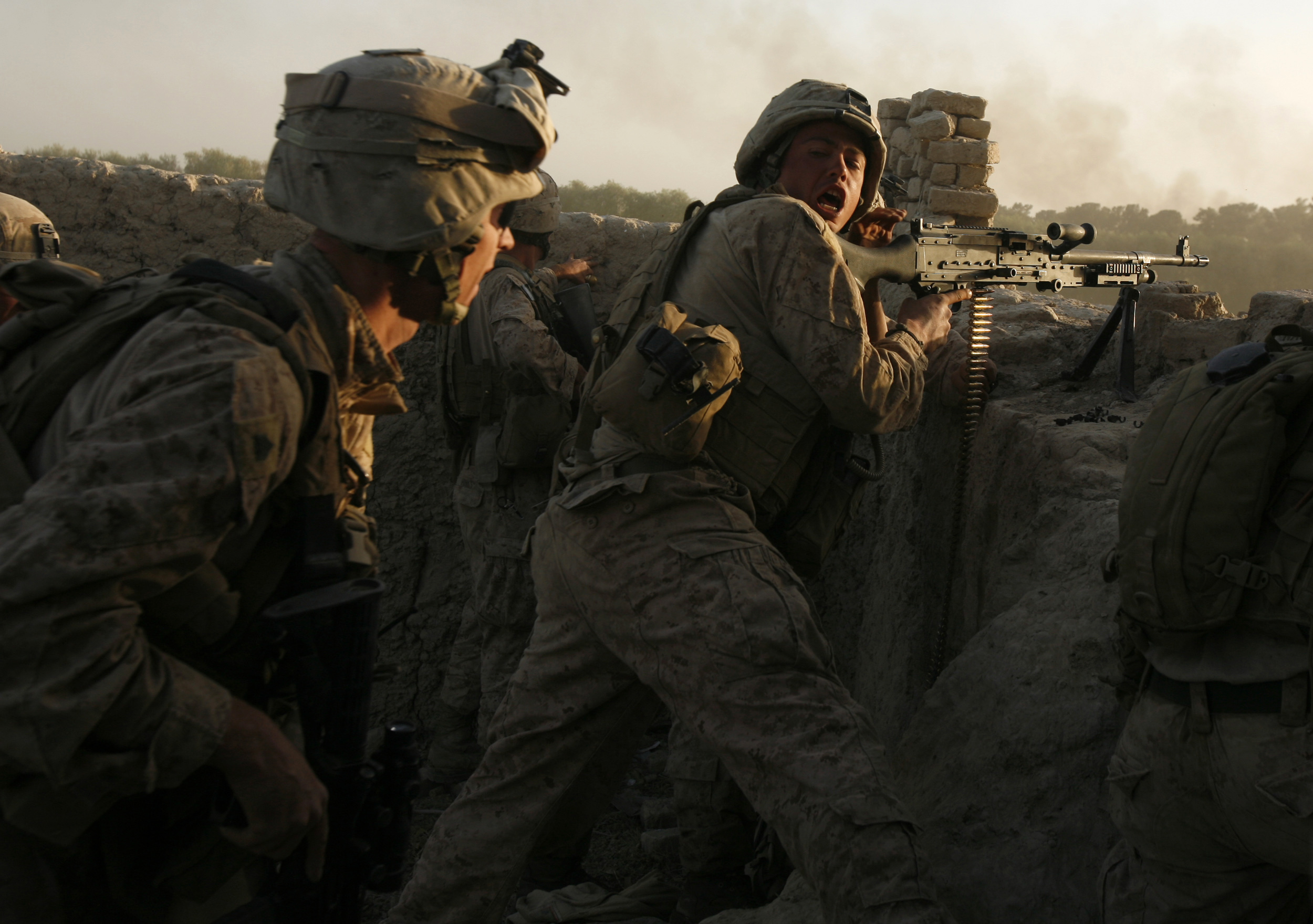Retreat, America
President Trump wants to ratchet up America's military engagement. We should do the opposite.


The most disturbing part of President Trump's first State of the Union address was his war-peddling bombast on North Korea. In a clear echo of George W. Bush's fulmination against Iraq in 2002, Trump argued that "North Korea’s reckless pursuit of nuclear missiles could very soon threaten our homeland. … We need only look at the depraved character of the North Korean regime to understand the nature of the nuclear threat it could pose to America and to our allies."
In this, as in other policy arenas, a reliable heuristic to find sensible, wise policy is what we might call the Costanza Doctrine: Whatever Trump is proposing, do the opposite. If Trump is angling for war in North Korea, America should push for peace. If Trump wants to build a wall on our border with Mexico and deport millions of immigrants, America should give full amnesty to all of them. And so on.
The same is true of our many brushfire conflicts around the globe, which many of the warmongers whispering in Trump's ear want to pour gasoline on. America should do the opposite. Nearly all of these conflicts should be ended, and American soldiers brought home.
The Week
Escape your echo chamber. Get the facts behind the news, plus analysis from multiple perspectives.

Sign up for The Week's Free Newsletters
From our morning news briefing to a weekly Good News Newsletter, get the best of The Week delivered directly to your inbox.
From our morning news briefing to a weekly Good News Newsletter, get the best of The Week delivered directly to your inbox.
American troops were deployed in well over 150 countries, and Special Forces in 138 countries as of 2016. Lest you think this accounts for just a random troop stationed here or there, overall, as of September 2017, there were significant deployments of over 1,000 troops in 19 countries: Afghanistan, Bahrain, Belgium, Cuba, Djibouti, Germany, Iraq, Italy, Japan, Jordan, South Korea, Kuwait, Qatar, Spain, Syria, Taiwan, Turkey, the United Arab Emirates, and the United Kingdom, according to a Pentagon spreadsheet.
The two biggest deployments are Cold War-vintage bases designed to check the Soviet Union. Germany has 47,055 U.S. troops and Japan has 51,452 military personnel. These, at least, seem relatively harmless. But that's about all that can be said for them.
Why are we bothering to maintain huge bases at vast expense in the middle of peaceful countries, almost three decades after the principal reason for their existence has vanished? Most or all of these Americans can come home. America can easily maintain the nuclear security umbrella over Europe with a couple submarines. We don't need tens of thousands of people there.
We have 27,123 Americans deployed in South Korea. That's a more sensitive area because Trump keeps ratcheting up tensions. But I will concede that even without him, one wouldn't want to simply pull out those troops and upset the delicate status quo. After Trump is gone, U.S. diplomats should work on finally ending the Korean War (which is technically still going on), and restoring a state of peaceful relations between the two countries. If that can be achieved (a big if, to be sure), then that deployment can be drastically reduced as well.
A free daily email with the biggest news stories of the day – and the best features from TheWeek.com
Middle East deployments are the next biggest category. Afghanistan has 16,500 people, Bahrain has 9,826, Djibouti has 4,715, Iraq has 9,123, Jordan has 2,730, Kuwait has 16,712, Qatar has 6,671, Syria has 1,723, Turkey has 2,273, and the U.A.E. has 4,240. It's hard to know exactly what these people are even doing due to secrecy and military deception, but I submit that they are almost completely worthless in terms of U.S. national interest — and often deeply harmful.
For starters, Afghanistan is lost, and the sooner we admit that, the better. Iraq has mostly taken back its territory from ISIS, and ought to be allowed to stand on its own feet. Much of the rest of these deployments are supporting drone strikes, a wretched policy that has a high rate of civilian casualties and has given entire towns and villages PTSD. Those should be stopped immediately as well.
The things we are doing in these countries are not helping anyone, and the people who are doing them should come home.
That brings me to the hundreds of small Special Forces deployments. The military won't even list all the names of every country these people are involved in, but I see no reason to suspect they're doing any good at all. First, the level of military aggression going on these days with no input from Congress or the citizenry — where you sometimes can't even know what country the commandos are in, let alone what they're doing — is appalling. If American forces are to be deployed, let it happen after democratic deliberation, not because some mercenary corporation has close ties to the White House.
Second, as Jeremy Scahill wrote in his book Dirty Wars, the actual U.S. record in this kind of brushfire conflict is almost universally abysmal. It's akin to what British colonial troops used to do back in the heyday of that global empire. It's a safe bet that pretty much all of these troops can come home now.
Obviously one can't make a complete strategic plan without knowing exactly what these troops are doing. But what we can say is that the Greater Middle East is nearly two decades into violent American meddling in every corner of the place, and is a smoking ruin very largely because of that. Soon enough, the young Americans enlisting to fight in Afghanistan will have been born after the war there started. The country is worse off today than it was in 2001. Why are we still there?
Perhaps some soldiers and personnel can provide some useful mostly non-violent public goods, like standing guard over shipping lanes or internet transmission lines. But insofar as they are involved in violent, pointless imperialism, they should be pulled out immediately. Instead of the current knee-jerk belief that whatever the military does is good by definition, there should be an opposite bias against war. Blowing people up should be the policy of absolute last resort. If we want to improve humanitarian outcomes, let us start with options that have a reasonable chance of success, like helping refugees or handing out anti-malaria bed nets.
Enough with the perpetual war. It's time for America to retreat. The world will be better off without our soldiers, guns, and drone strikes.
Ryan Cooper is a national correspondent at TheWeek.com. His work has appeared in the Washington Monthly, The New Republic, and the Washington Post.
-
 Woolf Works: the Royal Ballet’s ‘inspired’ production’
Woolf Works: the Royal Ballet’s ‘inspired’ production’The Week Recommends Wayne McGregor’s three-act show brings Virginia Woolf’s creative world ‘vividly’ to life
-
 The 8 best biopic movies of the 21st century (so far!)
The 8 best biopic movies of the 21st century (so far!)the week recommends Not all true stories are feel good tales, but the best biopics offer insight into broader social and political trends
-
 Washington grapples with ICE’s growing footprint — and future
Washington grapples with ICE’s growing footprint — and futureTALKING POINTS The deadly provocations of federal officers in Minnesota have put ICE back in the national spotlight
-
 The billionaires’ wealth tax: a catastrophe for California?
The billionaires’ wealth tax: a catastrophe for California?Talking Point Peter Thiel and Larry Page preparing to change state residency
-
 Bari Weiss’ ‘60 Minutes’ scandal is about more than one report
Bari Weiss’ ‘60 Minutes’ scandal is about more than one reportIN THE SPOTLIGHT By blocking an approved segment on a controversial prison holding US deportees in El Salvador, the editor-in-chief of CBS News has become the main story
-
 Has Zohran Mamdani shown the Democrats how to win again?
Has Zohran Mamdani shown the Democrats how to win again?Today’s Big Question New York City mayoral election touted as victory for left-wing populists but moderate centrist wins elsewhere present more complex path for Democratic Party
-
 Millions turn out for anti-Trump ‘No Kings’ rallies
Millions turn out for anti-Trump ‘No Kings’ ralliesSpeed Read An estimated 7 million people participated, 2 million more than at the first ‘No Kings’ protest in June
-
 Ghislaine Maxwell: angling for a Trump pardon
Ghislaine Maxwell: angling for a Trump pardonTalking Point Convicted sex trafficker's testimony could shed new light on president's links to Jeffrey Epstein
-
 The last words and final moments of 40 presidents
The last words and final moments of 40 presidentsThe Explainer Some are eloquent quotes worthy of the holders of the highest office in the nation, and others... aren't
-
 The JFK files: the truth at last?
The JFK files: the truth at last?In The Spotlight More than 64,000 previously classified documents relating the 1963 assassination of John F. Kennedy have been released by the Trump administration
-
 'Seriously, not literally': how should the world take Donald Trump?
'Seriously, not literally': how should the world take Donald Trump?Today's big question White House rhetoric and reality look likely to become increasingly blurred
